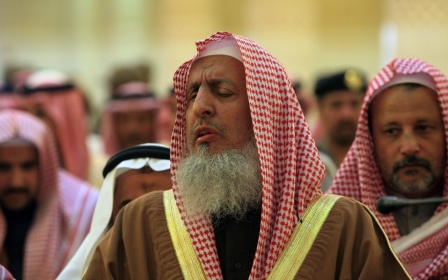Surge of support in Saudi Arabia for preacher al-Hashemi

Detained Saudi political and human rights activist Saud al-Hashemi has attracted a groundswell of support on social media after going on hunger strike to protest at alleged mistreament in prison.
Hashemi was sentenced to 30 years in prison in 2007 for charges that included attempting to overthrow the government, after a long career as one of Saudi Arabia’s few independent preachers and an activist calling for reform.
In December 2012 the Geneva based human rights group Alkarama recognised Hashemi’s activism and released a video portrait profiling his work and subsequent detention.
He began a hunger strike on 9 August this year, protesting at mistreatment by prison authorities. Four days in, his strike was broken by force, after he had been held in a freezing cold bare prison cell for 48 hours, according to the UK-based Saudi run human rights organisation al-Qst.
He renewed the strike after his books were banned at the end of August, and this latest hunger strike has been ongoing since then.
The upsurge in support for Hashemi comes as his health continues to deteriorate, amid reports by the Young Journalists Club that prison authorities in Jeddah are subjecting him to “physical and psychological torture” including sleep deprivation.
Social media users have been voicing their solidarity with Hashemi on the hashtag #SaudAlHashemiStrikes, which now has over 200,000 impressions.
Translation: #SaudAlHashemiStrikes
A man is dying slowly in a country alleged to be a place of justice, equality, humanity and the rule of shari’a. In truth we live by the shari’a of the jungle. Hope he will be released, and so will we.
Translation: #SaudAlHashemiStrikes Unjust rulers implement laws to serve their own ends, and use them to take control over the people. Then they consider any violation not only a crime but also blasphemy
Twitter usage in Saudi Arabia has rapidly grown in the past two years. It is now the fastest growing Twitter market in the world according to the Global Web Index – a report in March by the Dubai School of Government said 29 percent of all tweets in the Middle East come from the Gulf State.
Human rights activists have said the Hashemi campaign has two central demands.
“We are calling for his release and also, importantly, for authorities to permit him a visit to his very unwell mother,” said Yahya Assiri, head of the al-Qst human rights group. “Prison officials have offered him three hours out of his cell to visit her, accompanied by 30 guards, but she is in a hospital some two hours away.”
“They have deliberately done this in order to prevent him from being able to visit his mother.”
Assiri said many people had been shocked by the 30 year sentence given to Hashemi in 2007, which he said was longer than some punishments given to those convicted of plotting terror attacks in the kingdom.
He decried a deteriorating human rights atmosphere in Saudi Arabia, which he said has become ever more restricted since the advent of the Arab Spring.
“Since 2011 it has become very tough for human rights activists in Saudi Arabia,” he said. Unfortunately 2013 was a terrible year, with many activists jailed, and this year it has gotten worse and worse.”
New MEE newsletter: Jerusalem Dispatch
Sign up to get the latest insights and analysis on Israel-Palestine, alongside Turkey Unpacked and other MEE newsletters
Middle East Eye delivers independent and unrivalled coverage and analysis of the Middle East, North Africa and beyond. To learn more about republishing this content and the associated fees, please fill out this form. More about MEE can be found here.




